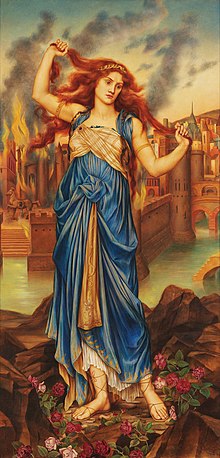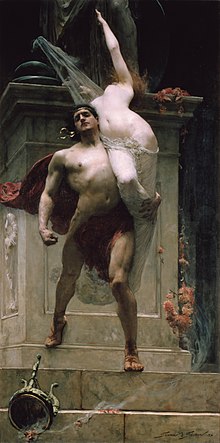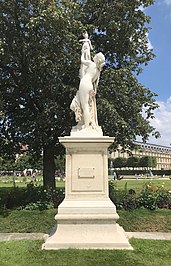Cassandra
In modern usage her name is employed as a rhetorical device to indicate a person whose accurate prophecies, generally of impending disaster, are not believed.
The older and most common versions of the myth state that she was admired by the god Apollo, who sought to win her love by means of the gift of seeing the future.
In other sources, such as Hyginus and Pseudo-Apollodorus, Cassandra broke no promise to Apollo, but rather the power of foresight was given to her as an enticement to enter into a romantic engagement, the curse being added only when it failed to produce the result desired by the god.
Later versions on the contrary describe her falling asleep in a temple, where snakes licked (or whispered into) her ears which enabled her to hear the future.
[a] Hjalmar Frisk (Griechisches Etymologisches Wörterbuch, Heidelberg, 1960–1970) notes "unexplained etymology", citing "various hypotheses" found in Wilhelm Schulze,[4] Edgar Howard Sturtevant,[5] J. Davreux,[6] and Albert Carnoy.
[12] One of the oldest and most common versions of her myth states that Cassandra was admired for her beauty and intelligence by the god Apollo, who sought to win her with the gift to see the future.
In Homer's work, Cassandra is mentioned a total of four times "as a virgin daughter of Priam, as bewailing Hector's death, as chosen by Agamemnon as his slave mistress after the sack of Troy, and is killed by Clytemnestra over Agamemnon's corpse after Clytemnestra murders him on his return home.
[13]" In Virgil's work, Cassandra appears in book two of his epic poem titled Aeneid, with her powers of prophecy restored.
In Book 2 of the Aeneid, unlike Homer, Virgil presents Cassandra as having fallen into a mantic state[14] and her prophecies reflect it.
te sequor, tota pater Troia sepulte; frater, auxilium Phrygum terrorque Danaum, non ego antiquum decus video aut calentes ratibus ambustis manus, sed lacera membra et saucios vinclo gravi illos lacertos.
I follow you, father buried with all of Troy; Brother, bulwark of Trojans, terrorizer of Greeks, I do not see your beauty of old or hands warmed by burnt ships, But your lacerated limbs and those famous shoulders savaged By heavy chains.
Many versions of the myth relate that she incurred the god's wrath by refusing him sexual favours after promising herself to him in exchange for the power of prophecy.
[19]In Virgil's epic poem, the Aeneid, Cassandra warned the Trojans about the Greeks hiding inside the Trojan Horse, Agamemnon's death, her own demise at the hands of Aegisthus and Clytemnestra, her mother Hecuba's fate, Odysseus's ten-year wanderings before returning to his home, and the murder of Aegisthus and Clytemnestra by the latter's children Electra and Orestes.
[20] Coroebus and Othronus came to the aid of Troy during the Trojan War out of love for Cassandra and in exchange for her hand in marriage, but both were killed.
There she embraced the wooden statue of Athena in supplication for her protection, but was abducted and brutally raped by Ajax the Lesser.
But Poseidon smote the rock with his trident and split it, and Ajax fell into the sea and perished; and his body, being washed up, was buried by Thetis in Myconos".
[28] The play Agamemnon from Aeschylus's trilogy Oresteia depicts the king treading the scarlet cloth laid down for him, and walking offstage to his death.[29]: ln.
Her madness that is unleashed now is not the physical torment of other characters in Greek tragedy, such as in Euripides' Heracles or Sophocles' Ajax.
According to author Seth Schein, two further familiar descriptions of her madness are that of Heracles in The Women of Trachis or Io in Prometheus Bound.[30]: p.








